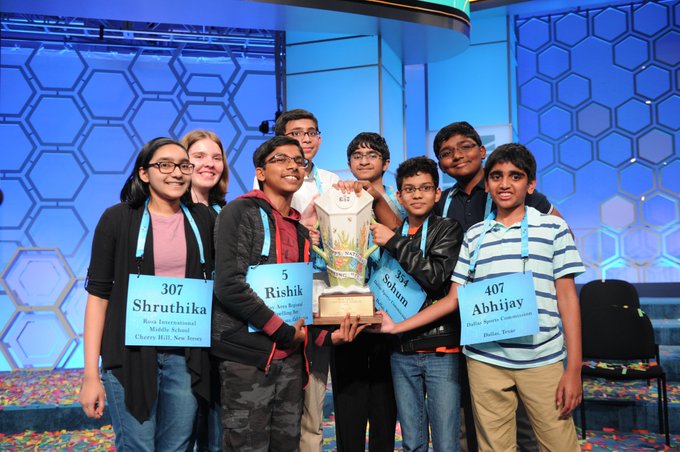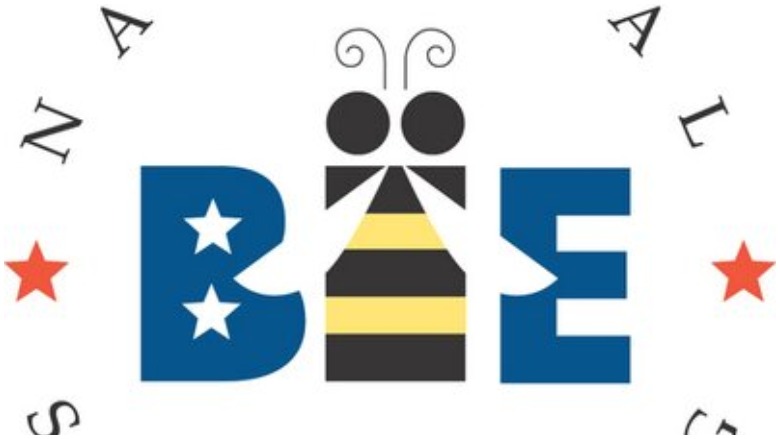
Scripps National Spelling Bee There were eight National Spelling Bee winners.
It was an outstanding night of scholarship and competition in the 2019 Scripps National Spelling Bee and, in the end, eight youths were still standing. Yes, eight.
All eight were named as the co-winners of the National Spelling Bee in an unprecedented finale. Scripps had run out of challenging words.
The National Spelling Bee wrote:
“Dictionary loses to 2019 Scripps National Spelling Bee Co-Champs:
#Speller5 Rishik Gandhasri
#Speller93 Erin Howard
#Speller132 Saketh Sundar
#Speller307 Shruthika Padhy
#Speller354 Sohum Sukhatankar
#Speller407 Abhijay Kodali
#Speller427 Christopher Serrao
#Speller462 Rohan Raja.”
Noted the Guardian: “Rohan Raja spells odylic correctly and it’s official: the championship will be split eight ways. Rishik Gandhasri, Erin Howard, Saketh Sundar, Shruthika Padhy, Sohum Sukhatankar, Abhijay Kodali, Christopher Serrao and Rohan Raja are your co-champions! A run of 47 correct words to end it!”
The victory was no easy task; the winner was one of 562 teenage spellers competing on the national stage, according to SI. They are all under the age of 15.
Here’s what you need to know:
1. The Winners Spelled a Lot of Difficult Words
What did the eight finalists spell to make it to the podium? A lot of difficult words. According to the bee:
Our first champion is Rishik Gandhasri, speller 5. The California seventh grader spelled “auslaut” correctly.
“It’s great to be here,” said Erin Howard, speller 93 and an Alabama eighth grader.
Her word was “erysipelas.”
“Can I have the definition please, I beg you, the definition?”
She spelled it correctly.
Saketh Sundar, speller 132 and a Maryland eighth grader, spelled “bougainvillea” correctly.
Shruthika Padhy, speller 307 and a New Jersey eighth grader, spelled “aiguillette” and got it right.
Sohum Sukhatankar, speller 354, spelled “pendeloque” correctly. He’s a Texas seventh grader.
Abhijay Kodali, speller 407, finished third last year. Tonight, he spelled “palama” correctly. The Texas sixth grader is also a champion.
Christopher Serrao, speller 427, spelled “cernuous” correctly. He’s a seventh grader from Texas.
And Rohan Raja, speller 462, spelled “odylic” correctly. He’s also a Texas seventh grader.
They are all champions.
How much money does the winner take home? According to SI, it’s not a small chunk of change, at least when there’s usually a single winner (it wasn’t immediately clear how the split will now work).
The winner gets $50,000 in cash and an engraved trophy, and that’s just for starters. The magazine also reports that the winner gets $2,500, “a reference library from Merriam-Webster,” and “$400 of reference works from Encyclopedia Britannica.”
The prizes are $25,000 and $15,000 for the second and third place winners, SI reports.
2. The National Spelling Bee Has Existed for 90 Years
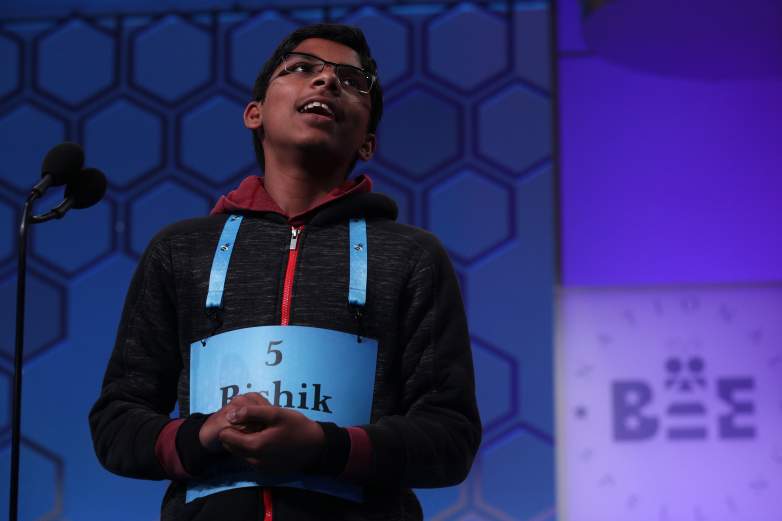
Rishik Gandhasri of San Jose, California, rejoices after he correctly spelled the word “myctophid” during round ten of the Scripps National Spelling Bee at the Gaylord National Resort & Convention Center May 30, 2019 in National Harbor, Maryland.
What’s technically called the Scripps National Spelling Bee has been around for almost a century. The first National Spelling Bee was held in 1925. The only years since without a national bee were a few years during World War 2.
According to the National Spelling Bee’s website, every year, “students from all walks of life have the opportunity to participate in the Scripps National Spelling Bee, one of the nation’s oldest and most iconic competitions. They progress from classroom to cafeteria, from auditorium to civic center, delighting friends, family, sponsors and fans, just as millions of other students have done before them.”
There’s a deeper reason for it all: “Our purpose is to help students improve their spelling, increase their vocabularies, learn concepts and develop correct English usage that will help them all their lives,” the Bee notes.
3. Fifty Youths Advanced to the Finals
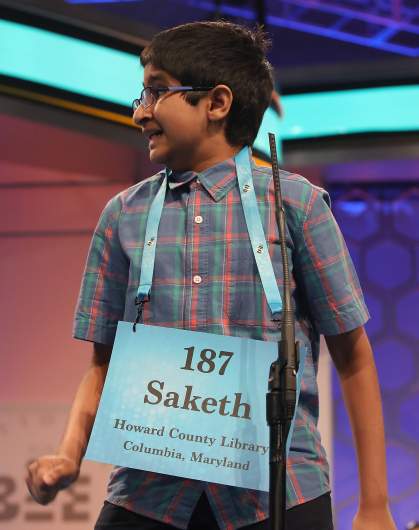
Saketh Sundar of Elkridge, Maryland reacts after spelling his word correctly during the final round of 2017 Scripps National Spelling Bee at Gaylord National Resort & Convention Center June 1, 2017 in National Harbor, Maryland. Close to 300 spellers are competing for the top honor in the annual spelling contest.
How does the bee work? Fifty youths in all advanced to the final competition. You can see a list of their names here.
“The Preliminaries consisted of the Preliminaries Test and two rounds of onstage oral spelling,” explains the bee.
On its blog, the Spelling Bee chronicled how some of the finalists were eliminated. One competitor, for example, misspelled “Chama,” which the bee described as “a member of a genus of eulamellibranchiate bivalve mollusks of warm or tropical seas having fixed massive irregular inequivalve shells and comprising the rock oysters and extinct related forms.”
Another finalist was eliminated by misspelling misspelled “jalap,” described by the bee as “the dried purgative tuberous root of a Mexican plant or the powdered drug prepared from it.”
4. People on Social Media Rooted for the ‘Bee’ Kids
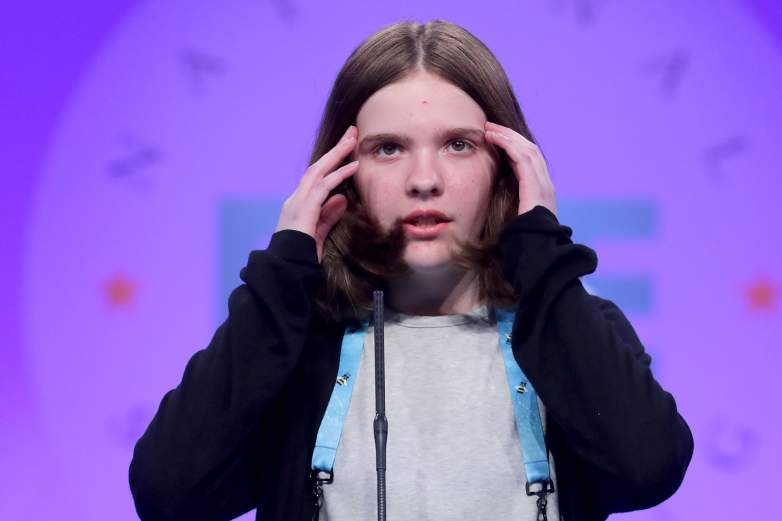
Erin Howard successfully spells the word ‘sgenestrole’ during the final rounds of the 91st Scripps National Spelling Bee at the Gaylord National Resort and Convention Center May 31, 2018 in National Harbor, Maryland.
People on social media enjoyed watching good kids who were participating in something so positive. About 11 million students participate in the National Spelling Bee at some level, although only more than 500 made it to the national competition.
The Scripps Twwitter page was doing a running report on which kids were spelling which word.
5. The Word Spelling ‘Bee’ Derives From Middle English
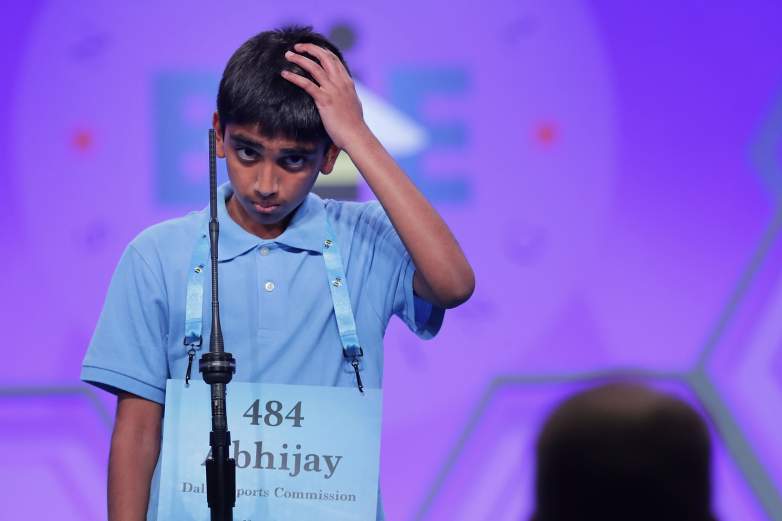
Abhijay Kodali successfully spells the word ‘ceinture’ during the final rounds of the 91st Scripps National Spelling Bee at the Gaylord National Resort and Convention Center May 31, 2018 in National Harbor, Maryland. Forty one finalists were selected to participate in the final day after a record 516 spellers were officially invited, up from 291 in 2017.
Maybe you’ve wondered (or maybe not) why it’s called a spelling bee in the first place.
According to NBC San Diego, Merriam-Webster claims the word bee “is an alteration of a word that meant ‘voluntary help given by neighbors toward the accomplishment of a particular task,’ and descends from the Middle English word bene.”
